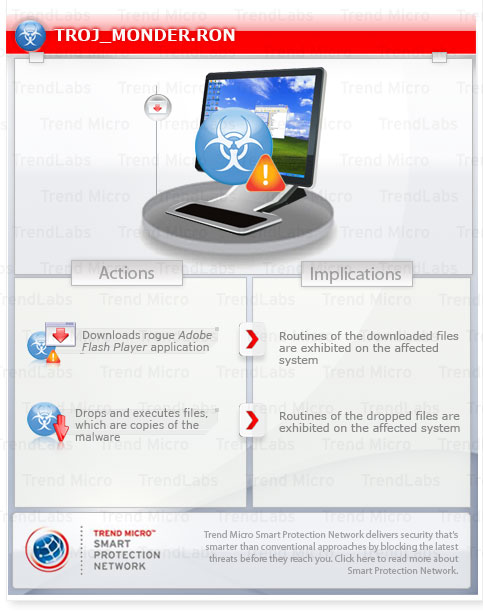TROJ_MONDER.RON
Windows 98, ME, NT, 2000, XP, Server 2003


Threat Type: Trojan
Destructiveness: No
Encrypted: No
In the wild: Yes
OVERVIEW
Trend Micro has flagged this Trojan as noteworthy due to the increased potential for damage, propagation, or both, that it possesses. Specifically, it uses search engine optimization (SEO) poisoning techniques that may lure the customers to unknowingly download a rogue Adobe Flash Player application which is the malware itself.
To get a one-glance comprehensive view of the behavior of this Trojan, refer to the Threat Diagram shown below.

This Trojan displays fake alerts that warn users of infection. It also displays fake scanning results of the affected system. It then asks for users to purchase it once scanning is completed. If users decide to purchase the rogue product, users are directed to a certain website asking for sensitive information, such as credit card numbers.
TECHNICAL DETAILS
Arrival Details
This Trojan may be unknowingly downloaded by a user while visiting the following malicious websites:
- http://{BLOCKED}win.co.cc/
Installation
This Trojan is injected into the following processes running in memory:
- firefox.exe
- maxthon.exe
- mozilla.exe
- opera.exe
- safari.exe
Autostart Technique
This Trojan adds the following registry entries to enable its automatic execution at every system startup:
HKEY_CURRENT_USER\Software\Microsoft\
Windows\CurrentVersion\Run
JDK55WFMZY = %User Temp%\cdx.exe
It registers as a system service to ensure its automatic execution at every system startup by adding the following registry keys:
HKEY_LOCAL_MACHINE\SYSTEM\CurrentControlSet\
Services\SSHNAS
(Default) =
Other System Modifications
This Trojan adds the following registry keys:
HKEY_CURRENT_USER\Software\JDK55WFMZY
(Default) =
HKEY_CURRENT_USER\Software\W34BCG2GRJ
(Default) =
HKEY_CURRENT_USER\SOFTWARE\XML
(Default) =
Dropping Routine
This Trojan drops the following files:
- %System%\sshnas21.dll - detected as TROJ_MONDER.RON
- %Windows%\cwohia.exe - detected as TROJ_MONDER.RON
(Note: %System% is the Windows system folder, which is usually C:\Windows\System on Windows 98 and ME, C:\WINNT\System32 on Windows NT and 2000, or C:\Windows\System32 on Windows XP and Server 2003.. %Windows% is the Windows folder, which is usually C:\Windows or C:\WINNT.)
Download Routine
This Trojan connects to the following website(s) to download and execute a malicious file:
- http://{BLOCKED}.{BLOCKED}.64.105/perce/{random numbers}/{random numbers}/qwerce.gif - saved as %User Temp%/cdx.exe
- http://{BLOCKED}.{BLOCKED}.44.73/logos/{random numbers}/{random numbers}/logo.gif - saved as %User Temp%/cdv.exe
- http://{BLOCKED}.{BLOCKED}.35.3/werber/{random numbers}/517.gif - saved as %User Temp%/cdw.exe
Trend Micro detects the dowloaded file as:
- TROJ_MONDER.RON
Other Details
Based on analysis of the codes, it has the following capabilities:
- Creates scheduled tasks to execute files:
- {35DC3473-A719-4d14-B7C1-FD326CA84A0C}.job - executes %Windows%\cwohia.exe
- {8C3FDD81-7AE0-4605-A46A-2488B179F2A3}.job - executes %User Temp%\cdx.exe
(Note: %User Temp% is the current user's Temp folder, which is usually C:\Documents and Settings\{user name}\Local Settings\Temp on Windows 2000, XP, and Server 2003.)
It connects to the following possibly malicious URL:
- http://srv.{BLOCKED}ia.com/pre/getAds.php?{random}
Rogue Antivirus Routine
This Trojan displays fake alerts that warn users of infection. It also displays fake scanning results of the affected system. It then asks for users to purchase it once scanning is completed. If users decide to purchase the rogue product, users are directed to a certain website asking for sensitive information, such as credit card numbers.
SOLUTION
Step 1
For Windows XP and Windows Server 2003 users, before doing any scans, please make sure you disable System Restore to allow full scanning of your computer.
Step 2
Restart in Safe Mode
Step 3
Delete this registry key
Important: Editing the Windows Registry incorrectly can lead to irreversible system malfunction. Please do this step only if you know how or you can ask assistance from your system administrator. Else, check this Microsoft article first before modifying your computer's registry.
- In HKEY_CURRENT_USER\Software
- JDK55WFMZY
- JDK55WFMZY
- In HKEY_CURRENT_USER\Software
- W34BCG2GRJ
- W34BCG2GRJ
- In HKEY_CURRENT_USER\Software
- XML
- XML
- In HKEY_LOCAL_MACHINE\SYSTEM\CurrentControlSet\Services
- SSHNAS
- SSHNAS
Step 4
Restore this modified registry value
Important: Editing the Windows Registry incorrectly can lead to irreversible system malfunction. Please do this step only if you know how or you can ask assistance from your system administrator. Else, check this Microsoft article first before modifying your computer's registry.
- In HKEY_LOCAL_MACHINE\SOFTWARE\Microsoft\Windows NT\CurrentVersion\SvcHost
- From: netsvcs = {includes name of added service}
To: netsvcs = {system-defined}
- From: netsvcs = {includes name of added service}
Step 5
Search and delete these files
- %System%\sshnas21.dll
- %User Temp%\cdv.exe
- %User Temp%\cdw.exe
- %User Temp%\cdx.exe
- %Windows%\cwohia.exe
- {35DC3473-A719-4d14-B7C1-FD326CA84A0C}.job
- {8C3FDD81-7AE0-4605-A46A-2488B179F2A3}.job
Step 6
Restart in normal mode and scan your computer with your Trend Micro product for files detected as TROJ_MONDER.RON. If the detected files have already been cleaned, deleted, or quarantined by your Trend Micro product, no further step is required. You may opt to simply delete the quarantined files. Please check this Knowledge Base page for more information.
Did this description help? Tell us how we did.


